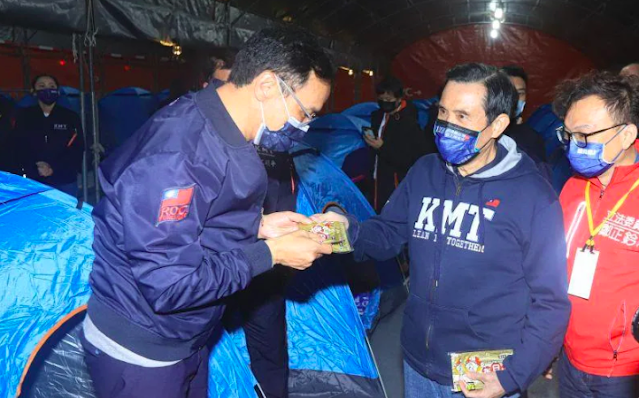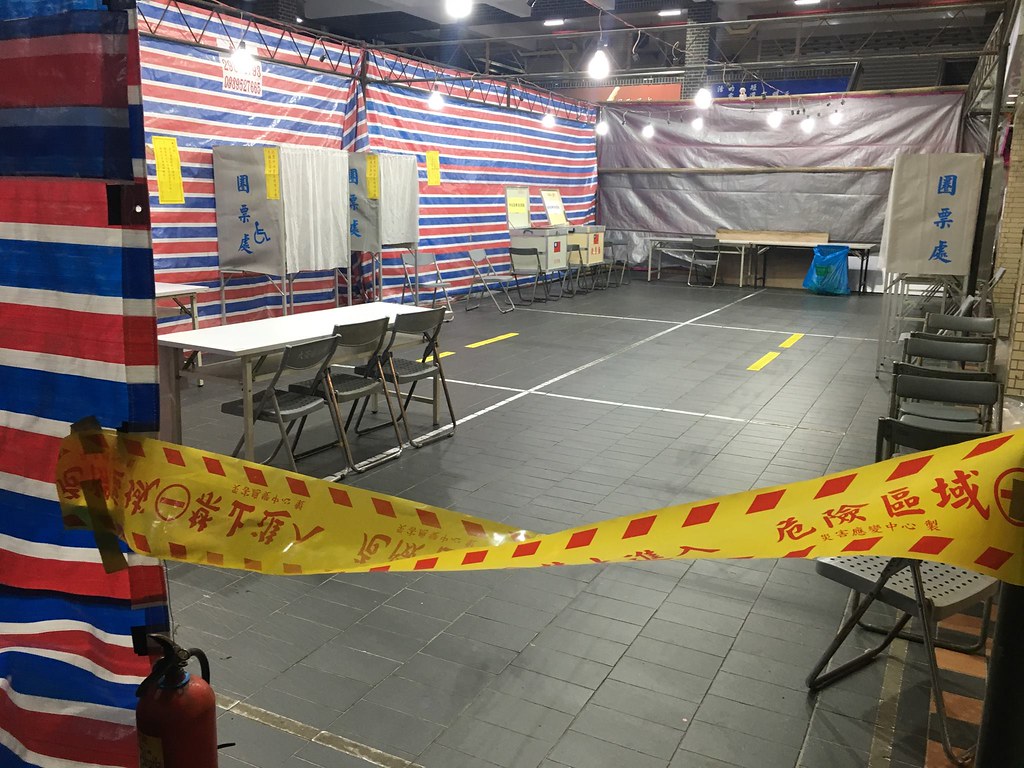I haven't said anything about the referendum vote yesterday because the straight-up fact is this: I just haven't cared enough.
Now that all four have gone down in flames -- neither reaching the vote threshold nor garnering more 'yes' votes than 'no' -- I figure maybe it's time to offer up an opinion, such as it is.
Frozen Garlic has pretty much said most of what's worth saying about why voters stayed home, and why those who came out voted as they did. Notably, the fact that the DPP made it easier to get referendums going, the KMT managed to use this against the DPP once already, and despite these issues not being linked to the KMT's unpopular stances vis-a-vis China and Taiwanese identity, they still couldn't eke out anything close to a win. As Frozen Garlic points out, they did this to themselves.
I also agree that very little of the result had to do with detailed policy arguments, but quite possibly a lot to do with widespread distrust of the KMT. To wit:
One possibility is that when these issues became associated with the KMT, they became a lot less popular. That is, perhaps people were willing to support the LNG/reef policy, but they weren’t willing to support the KMT LNG/reef policy. The KMT was a dead weight that not even a popular issue could save.
Perhaps I like this because it's a great analysis of why the liquefied natural gas/reef referendum failed. Perhaps it's because I too, regardless of policy, simply do not trust the KMT to run the country. I don't think the DPP is perfect by any means, but Tsai mostly seems to do a solid job. I trust her, and she's given me reasons to trust her.
In other words:
Maybe this referendum will be a message to the KMT that it can’t paper over its unpopular identity and China positions by distracting voters with shiny objects. Maybe they will be motivated to finally start thinking about altering those unpopular stances on the most critical issues.
Probably not though. Eric Chu has already signaled that he is more comfortable finding excuses than reflecting on the causes of defeats. I keep waiting for the KMT to reform itself, and it keeps disappointing me.
I get the feeling that Eric Chu spends a lot of time not realizing how disappointing he is, which is perhaps why he's a spot-on choice to chair the party that always disappoints and doesn't even seem to realize it.
But there's one area where I differ just a bit. Frozen Garlic says:
In their ungracious remarks tonight, Johnny Chiang and Eric Chu put the blame for the defeats on the DPP. Chiang said that the DPP had unfairly twisted these narrow issues by claiming they were about broader things, like international trade, relations with the United States, overall economic development, and what China wants. Apparently, when the KMT tries to deal the DPP government a serious policy setback, he doesn’t expect the DPP government to fight back to defend its agenda.
Yes, all correct. The thing is, I think the DPP is right about that. These referendums did tie in to broader, more important things like international trade, economic development and energy security. Does ractopork matter? No, not really. But in terms of international trade and relations with the US, it does matter.
Does the Gongliao nuclear power plant matter? Not really. Ma Ying-jeou himself mothballed it, and it's unlikely that it'd ever actually get restarted. But public sentiment on what role nuclear power should play in Taiwan's energy policy does matter.
Does the LNG plant matter? Now that there are revised plans to move it further out to sea, I don't think so. But the DPP asking the public to trust them that the LNG plans were both environmentally safe and necessary to Taiwan's energy policy and security? Yes, those things matter. Taiwan's energy security and ending dependence on coal? Yes, that matters very much indeed.
And the referendum timing? I'm honestly not sure it matters, though I think Donovan is right that the initial decoupling from elections was a blatant strategic move by the DPP, though I'm not sure about the weather angle. However, whether the public thinks the DPP can be trusted to make such decisions -- or whether they care at all -- does matter.
The thing is, the very fact that each of these items ties into a broader discussion about Taiwan's present and future seemed to matter less than the fact that each individual issue was boring. I can't vote in Taiwan, but when I vote in the US I choose people to represent me whom I trust to deal with these fairly small things in a general direction I support -- the big things these issues all tie into -- even if I don't agree with every little thing.
It's possible that many Taiwanese voters ultimately decided they felt the same way: we elect people to figure these things out. If we don't like the general direction, we vote for someone else. Please don't ask me to vote on everything from algal reefs to ractopamine, when I am an expert in none of it!
What's interesting, though, is that the KMT couldn't seem to win whether we're talking big or small. Whether you think ractopork was just about ractopork or the grand theatre of international trade, either the KMT picks bad issues, or they have bad policies, or the public doesn't trust them regardless.
Beyond that, it's amusing just how weirdly hypocritical the KMT is on just about every single issue.
On nuclear power, as noted above, the fourth plant was mothballed by President Ma. Now Ma seems to be the strongest voice in favor of restarting it, to the point that I think he's been giving both Johnny Chiang and Eric Chu his warm package for awhile now.
On the LNG terminal, this source states that it's been an active project since 2016, which means it must have been drafted and proposed before that. Who was in power before 2016? The KMT. Despite some media making the whole thing about the DPP's energy goals, this feels like yet another KMT turnaround.
On ractopork, remember that once again, the KMT allowed ractopamine beef imports and tried to allow in pork, but withdrew from that position amid public backlash. It's true that the DPP opposed it then, but the fact is that we now have some idea of what standards for ractopamine levels should be, which we didn't back then (interestingly, the safety data came out right around the time Taiwan was fighting about this in 2012, so it's not like the KMT doesn't know about it). So on that, too, the KMT come out looking like the bigger hypocrites.
Ma Ying-jeou, Mr. Ractobeef and Wannabe Mr. Ractopork, out there fighting ractopork if the DPP is doing it? Come on.
In fact, I suspect both parties know that these imports are important to US-Taiwan relations and are perfectly aware that if they're in power, pushing for their approval is a no-brainer, but they'll resolutely oppose the other party doing so. I'm curious to see whether 2026 will be the year of the DPP opposing KMT President Hou's approval of American racto-lamb. Will 2035 be the year of the KMT opposing DPP racto-venison? I hope we live through the climate wars to find out!
On referendums, Donovan's already pointed out that the KMT has found itself in the very weird position of defending the DPP's old stance. Once again, I have to wonder what the KMT even stands for other than thinking Taiwan is Chinese and they Taiwan's superior Chinese leaders, and opposing the DPP. That's it, really. It's not like they can be trusted with the economy, or the environment, or China, or fighting corruption, or even defending Taiwan. Even on infrastructure, they seem to favor bloat over utility.
I'd love to see real opposition that one could reasonably vote for to keep the DPP accountable, but I fail to see the point of the KMT at all, except as opposition for the mere, shrieking, hypocritical sake of it.
If you're wondering how I would have voted if I'd been able, I would have given the LNG/reef and election/referendum items serious consideration. The first for environmental reasons, and the second because holding elections and referendums at the same time doesn't seem like an obviously bad idea on its face (and was also how things worked in Taiwan until recently). But in the end, I probably would have gone no on both.
The first because energy security matters a lot, and while I don't know who's right on the environmental angle, I certainly don't trust the KMT as stewards of Taiwan's fragile algal reefs. The second, because after the 2018 disaster I'm just not huge on referendums in general. They're an important democratic tool but I don't necessarily want every single issue to be up for a majoritarian vote. It may seem more democratic, but I'm not at all sure it actually is.
On the other two, I'd be a clear no: if both parties intend to allow ractomeat imports when they're in power, then I'm not voting for some ridiculous cudgel. On the nuclear plant, even if they've resolved the 'garbage in the cooling tanks' issue from a decade ago and had a safe way to store waste, I don't think Taiwan's plants could withstand a Fukushima-like event.
I'm not actually anti-nuclear per se, I just don't think it's right for Taiwan. And as long as there's still nuclear waste non-consensually present on Indigenous lands, there are ethical issues to consider as well.
Could Taiwan make nuclear safely and ethically? Certainly, if the government really wanted to. Would they? Doubt it. So that's a no.
In other words, the KMT picked four boring issues to be hypocritical about, all of which should be the purview of the leaders the people have elected to deal with rather than a big annoying resource suck. I'm not feelin' it.


